非谓语动词的一些特殊用法
- 格式:doc
- 大小:11.50 KB
- 文档页数:1
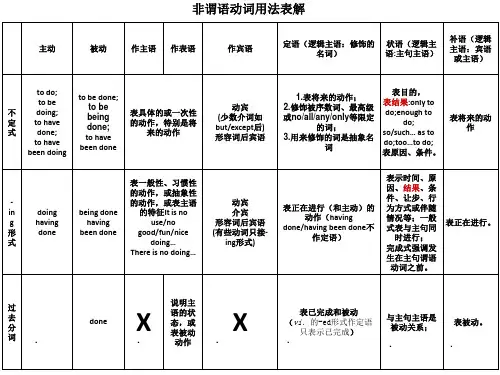
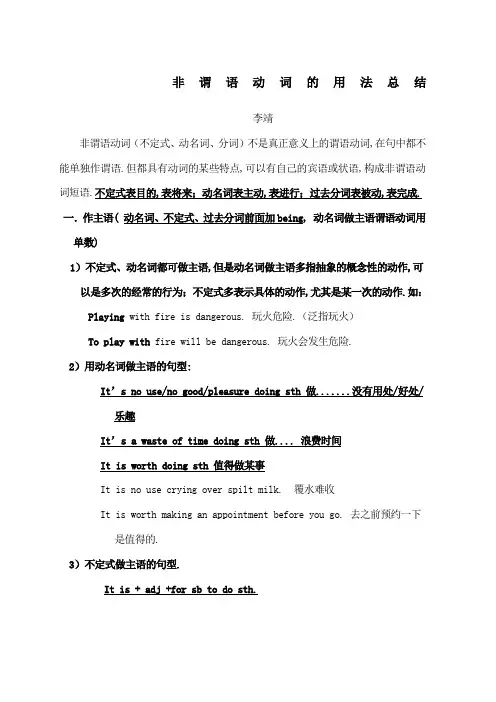
非谓语动词的用法总结李靖非谓语动词(不定式、动名词、分词)不是真正意义上的谓语动词,在句中都不能单独作谓语.但都具有动词的某些特点,可以有自己的宾语或状语,构成非谓语动词短语.不定式表目的,表将来;动名词表主动,表进行;过去分词表被动,表完成. 一.作主语( 动名词、不定式、过去分词前面加being, 动名词做主语谓语动词用单数)1)不定式、动名词都可做主语,但是动名词做主语多指抽象的概念性的动作,可以是多次的经常的行为;不定式多表示具体的动作,尤其是某一次的动作.如:Playing with fire is dangerous. 玩火危险.(泛指玩火)To play with fire will be dangerous. 玩火会发生危险.2)用动名词做主语的句型:It’s no use/no good/pleasure doing sth 做.......没有用处/好处/乐趣It’s a waste of time doing sth 做.... 浪费时间It is worth doing sth 值得做某事It is no use crying over spilt milk. 覆水难收It is worth making an appointment before you go. 去之前预约一下是值得的.3)不定式做主语的句型.It is + adj +for sb to do sth.比较:表示人的品质时只能用of sb 如considerate/kind/nice/foolish/stupid/rude/cruel/wise/clever/brave/selfish/crazy/good/careful/careless/impolite/right/wrong等单词出现时.It is silly of you to say so.It is important for us to learn English well.It is a must/ a necessity for us to have a good command of the English language.4) “Wh- + to 不定式”可做主语.如:When to leave hasn’t been decided yet.什么时候动身还没定呢.Whether to drive or take the train is still a problem.是自驾车还是乘火车仍是一个问题.5)一般情况下,不定式和动名词作主语,谓语动词一般用单数形式.如: Seeing is believing.= To see is to believe 眼见为实.. Planting flowers needs constant watering.但and连接的多个动名词作主语,谓语动词大多用复数(如果前后动名词的语义一致,谓语一般用单数).如:Lying and stealing are immoral. 说谎与盗窃是不道德的.6) 动名词前面可以加上形容词性物主代词构成动名词的复合结构.如:----- What made him angry------ Mary’s /My/His/Her /Their/ The boy’s/ The president’s being late(made him angry.7)过去分词不能单独做主语,前面必须加上being,构成动名词,做主语.如:.Being examined twice a year , whether it is a car, a bus or a truck,.经典练习:1.It’s important for the figures_________ (update) regularly.2.No matter how bright a talker you are, there are times when it’s better ______(remain) silent.3.It’s really stupid of you _______ (tell)him the news yesterdayso it has been disturbing him all the time.4.___________(understand)your own needs and styles of communicationis as important as learning to convey your affection and emotions.5.__________(worry) about your grades doesn’t help.6.The engine just won’t start. Something seems _____ (go) wrong withit.参考答案:1. to update 2. to remain 3. to have told 4.understanding 5. worrying go改错题:一个句子最多有一处错误1. It’s standard practice for a company like this one employ a security officer.2. Hear how others react to the book you have just read creates an added pleasure.3. Know basic first-aid techniques will help you respond quickly to emergencies.4. Do well in an interview will be an important part of getting a place at university.told us whether have a picnic was still under discussion.prevent them from swimming in this river is a problem.参考答案:1. 在employ前加to 2. Hear 改为Hearing 3. Know 改为Knowing4. Do 改为Doing5. have 前加to6. prevent 前加to.二.作定语1)作定语的不定式如果是不及物动词,或者不定式所修饰的名词或代词是不定式动作的地点、工具等,不定式后面需要有相应的介词,如:The Browns have a comfortable house to live in2) 用不定式作定语的几种情况:a. 不定式表将来如:The car to be bought is for his sister.b. 用来修饰被序数词、最高级或no, all, any,the only 等限定的中心词,且与中心词为逻辑上的主动关系, 如:He was the best man to do the job.She was the first woman to win the gold medal in the Olympic Games.c. 有些名词的同根词常跟不定式,因而它们也常跟不定式做定语,常见的有:promise, plan, attempt, offer, decision, refusal, failure, ability, chance, warning, anxiety, eagerness, willingness, readiness等I don’t trust his promise to come for a visit.He said he had no plan to go there.He made an attempt to stand up.Birds’singing is sometimes a warning to other birds to stay away.3) 前置定语:V+ing 可以表示正在进行,也可以表示特征;过去分词表示已经完成或状态请区别下面短语:the boiling/ boiled water. 正沸腾的水(表正在进行)/白开水(表完成)a good-looking flower. 一朵好看的花儿(表特征)the developing countries/ the developed countries 发展中国家/发达国家the falling leaves / the fallen leaves正在下落的叶子/落叶the remaining money/ the money left 剩下的钱注意:英语中有些表示感觉的动词,其现在分词形式表示“令人感到…..的”,过去分词形式表示“感到….的”如:an exciting voice 一个令人兴奋的声音 an excited voice 一个兴奋的声音a puzzling expression 一个令人困惑的表情 a puzzled expression 一个困惑的表情4)区别下列后置定语的用法:to be done 表示被动、将来;done 表示被动、完成;being done 表示被动、正在进行;v+ing 表示主动;动词的系表结构直接去掉动词be;如果是不及物动词或者是感官系动词sound/taste/ feel/ smell/ look 和变化系动词就只有用V+ing形式.Have you read the novel written by DickensListen The song being sung is very popular with students.The question to be discussed at tomorrow’s meeting is a very important one.The food tasting delicious sells well.注意:不定式在后置定语中只表示将来,不表目的;having dong 或者having been done 一般用在状语中,不可以做后置定语,过去分词本身就表被动和完成.请完成下面的练习are many people ______ (wait) outside the hall.are many problems ______ ( remain) to be solved.flowers _______ (smell) sweet attract a lot of people.are many people _______ (invite) to the party.film, ______ (set) in the 19th century, won the medal.meeting_________(hold) now is of great importance.meeting_________(hold) yesterday was of great importance.meeting ________ (hold) tomorrow is of great importance.is always the first_______ (come) and the last _______ (leave).is the only person ________(know) the truth.was the best ______ (do) the job.13. A great number of students _________(question) said they were forcedto practice the piano.14. John has really got the job because he showed me the official letter_____(offer) it to him.15. After completing and signing it, please return the form to us in theenvelope ______ (provide)16. Birds’singing is sometimes a warning to other birds ______(stay)away.17. The room is empty except for a bookshelf_____(stand)in one corner.18. Laura was away in Paris for over a week. When she got home, therewas a pile of mail______(wait) for her.19. They might just have a place _____ (leave) on the writing course—whydon’t you give it a try20. In some languages, 100 words make up half of all words ____(use) indaily conversations.21. Volunteering gives you a chance _______ (change) lives, includingyour own.参考答案: . smelling 5. set held 8. to be held 9. to come 10.to leave know do 13. questioned 14. offering 15. provided16. to stay 17. standing 18. waiting 19. left 20. used 21.to leave 22. to change三.作表语(不定式/动名词/过去分词都可以做表语)1.动名词作表语表示抽象的概念性的动作,可以是多次的经常性的行为;不定式多表示具体的动作,尤其是某一次的动作例如:比较下列区别His favorite sport is swimming. (泛指游泳)Your task today is to wash the curtains.(指一次具体的工作)2 .excited/disappointed/frightened/pleased/satisfied/interested/puz zled/tired 感到…exciting/disappointing/frightening/pleasing/satisfying/interestin g/puzzling/tiring令人….He is moved by the moving movie.The film is moving.It is a pleasant trip.(pleasant 做前置定语)The trip is pleasing.(pleasing 做表语)3. 注意下列表达方式:My bag is missing/ lost/ gone. I find my bag missing/lost/gone.4. remain 的表语1) remain to be done 仍需去做/有待于…One problem remians to be solved.It remians to be seen whether the operation was successful.2) remain做“仍然是”讲时,可用名词,adj,介词,现在分词或者过去分词作表语He remained stuck (滞留)abroadPeter became a manager, but Jack remained a worker.Whatever achievements you’ve made, you should remain modest.无论你取得多么大的成就,你都该保持谦虚.He had to remain in hospital until he was better. 他不得不一直住院直到身体好些.This solid stone,square tower had remained standing for one thousand years.The guests came in, but she remained sitting/seated at the desk reading.客人们都来了,但她还坐在写字台旁读书.As before, he remained unmoved. 他和以往一样无动于衷.注意:1)用作不及物动词,意思是“剩下;剩余;遗留”,此时不能用进行时态,也没有被动语态.After the fire, very little remained of his house. 火灾过后,他的家所剩无几.2)remaining是形容词,意为“剩余的”,常作前置定语;而left则只能作后置定语.例如:There are still some apples left. 还剩余一些苹果. I bought a giftfor her with the remaining money. 我用剩余的钱给她买了一件礼物.3) remain作名词时表示“剩余物”,一般用其复数形式.例如:The archeologists found some remains of the Song Dynasty.考古学家发现了一些宋代遗迹.5. 1)主语+seem +(to be )+表语,表语多为名词或形容词Tom seems (to be ) a very clever boy. 汤姆看上去是一个非常聪明的男孩.The man over there seems to be a new teacher. 那边的那个人看上去像一个新老2) 主语+ seem to do sthbe doing sthhave done sthMrs. Green doesn’t seem (或seems not ) to like the idea. 格林夫人似乎不太喜欢这个主意.The children seemed to be eating something in the room. 孩子们好像正在房间里吃东西呢.The young man seemed to have changed much. 这个年轻人看起来变化很大.6. 当不定式用作表语时,其中的 to 原则上是不能省略的.如:His aim is t o do two years’ work in one. 他的目标是一年干两年的工作.但有一种例外,那就是当主语部分有动词do的某种形式时,用作表语的不定式可以省略to.如:What you first do is (to) mix the egg with flour. 你先得把鸡蛋和面粉和好.All I did was (to) touch the window, and it broke. 我只不过碰了一下窗户,玻璃就碎了经典练习1. My worry is your _______ (rely) too much on your parents.2. Please remain ______ (seat); the winner of the prize will be announced soon.3. For those with family members far away, the personal computer and thephone are important in staying________( connect)答案:四.作宾语(不定式和动名词都可以作宾语)1.只能用动名词作宾语的动词和短语考虑、建议和原谅,承认、推迟没得想像避免、继续练,否认完成停感谢不禁止介意准逃亡consider(考虑);advise/suggest/propose/recommend(建议);excuse/pardon(原谅);admit/acknowledge(承认);delay/postpone/put off(推迟); imagine/fancy(想像);avoid(避免);practise(练习);deny(否认);finish(完成); appreciate/acknowledge(感谢); forbid (禁止); mind(介意); escape(逃脱);此外,这些动词也跟动名词:miss(错过);enjoy(享受);risk (冒险);tolerate/bear/stand/put up with(容忍);quit(停止)advocate(提倡);resist (抵制)understand(理解);allow/permit(允许)feel like doing sth(喜欢做某事; give up doing (放弃做某事); keep doing(不停的做某事); be busy doing sth; can’t help doing sth(情不自禁); be worth doing sth (值得做某事);have difficulty/trouble doing sth(做...有困难/麻烦); have a hard/good time doing sth做.... 很开心/不开心; have fun doing sth 做.... 很开心 succeed in doing sth 成功做某事It is no use/good /pleasure doing sth做.......没有用处/好处/乐趣There is no point in doing sth= There is no need to do sth 没必要做某事It’s a waste of time doing sth 做.... 浪费时间It is worthwhile doing/ to do sth = be worthy to be done= be worthy of being done= be worth doing sth值得做某事2.只能用不定式作宾语的动词决心学会想希望,拒绝设法愿假装主动答应选计划,同意请求帮一帮decide/determine, learn, want, expect/hope/wish, refuse, manage, care, pretend, offer, promise, choose, plan, agree, ask/beg, help,(afford, strive, happen, wait, threaten口诀之外的单词)She pretended not to see me when I passed by.We agreed to meet here but so far she hasn’t turned up yet.3. forget,go on,mean,regret,remember,stop,try等动词或词组可带动名词或不定式作宾语,但意义上有区别.forget to do sth _________________ forget doing sth ______________________ go on to do sth __________________go on doing sth ______________________ mean to do sth____________________ mean doing sth___________________ regret to say/tell/inform/announce__________________________________ regret doing sth/having done________________________________________ remember to do sth_________________ remember doing sth________________ stop to do sth______________________ stop doing sth____________________ try to do sth______________________ try doingsth_________________________can’t help (to) do sth __________________ can’t help doing sth__________________can’t help but do sth =can’t but do sth ___________________sb used to do sth ___________________ sb be used to doing sth____________________sth be used to do sth ________________________be afraid to do sth不敢做某事 be afraid of doing sth担心发生某事be sure to do sth一定会.....be sure of doing sth确信会.....Let’s go on studying Lesson 6. (让我们继续学第六课.说明前面已学了一部分.)Let’s go on to study Lesson 6. (让我们接着学第六课.说明前面已学了第五课.)I remember doing the exercise. (我记得做过练习.)I must remember to do it. (我必须记着做这事.)I tried not to go there. (我设法不去那里.)I tried doing it again. (我试着又干了一次.)Stop speaking. (不要讲话.)He stopped to talk. (他停下来讲话.)I mean to come early today. (我打算今天早些来.)Missing the train means waiting for another hour.(误了这趟火车意味着再等一个小时)4.在allow,advise,forbid,permit等动词后直接跟动名词形式作宾语,如果后面有名词或代词作宾语,其后用动词不定式作宾语补足语:allow /advise/forbid/permit sb to do sthallow/advise/forbid/permit doing sthWe don’t allow smoking here.We don’t allow students to smoke.动词need,require,want作“需要”解,其后必须用动名词的主动形式或不定式的被动形式作宾语表示事情需要做,这时,动名词的主动式表示被动意义.be worth 后必须用动名词的主动形式来表示被动意义.…需要….…值得….deserve to be done/ doing …..值得….The window needs/requires/wants cleaning/to be cleaned.Her method is worth trying.These proposals deserve considering/ to be considered. 这些建议应该被考虑.devote oneself/ one’s time to (把...贡献给...);look forward to (期望);pay attention to (注意); attach importance to (重视); be used/accustomed to (习惯于做某事);when it comes to (当谈到做某事) ; get down to(着手);prefer doing sth to doing sth(喜欢...而不喜欢; turn to doing sth(转向);thanks to (多亏); lead to (导致);the key to doing sth (做某事的关键);object to/be opposed to (反对);contribute to (有助于);be addicted to doing sth (沉湎于;对...上瘾);make contributions to (对...做出贡献) ;due to (由于);apply oneself to (致力于) ;stick to(坚持);come close to (接近于)等后的动词也必须用动名词形式,例如:I look forward to hearing from you soon.6.不定式做动词(词组)tell, show, understand, explain, teach, learn, advise, discuss, ask, decide, wonder, find out 等的宾语时,前面常常带引导词how, what, whether, where, when, who等,但是why后加不带to的不定式.He showed us how to do the work= He showed us how we should do the work.I don’t know what to do= I don’t know what I should do.We must decide whether to stay or go= We must decide whether we’ll stay or go.Can you tell me why do it7.在love,hate,prefer,like等动词后用动名词或不定式无多大区别.有时用动名词作宾语时,指一般情况,而跟不定式作宾语时指某一具体行为.I love swimming. I love to swim today.,begin,continue在书面语中多后接动名词,在口语中多后接不定式.It started to snow. He is beginning to cook dinner. I began to understand what he meant.典型例题1. David threatened _____(report) his neighbor to the police if the damages were not paid.2. He chose _______(keep) silent when asked why.3. He volunteered _________(help) the victims in the earthquake.4. Whenever you are in trouble, don’t hesitate _______(ask) me for help.5. As a result of the serious flood, two-thirds of the buildings in the area need ______(repair).6. —Can I smoke here—Sorry. We don’t allow ______(smoke) here.7. I hear they’ve promoted Tom, but he didn’t mention ______(promote) when we talked on the phone.8. Bill suggested _______(hold) a meeting on what to do for the Shanghai Expo during the vacation.9. I really appreciate _______(have) time to holiday with you on this nice island.10. I can hardly imagine her _______(marry) such a men as Lee.11. It’s quite hot today. Do you feel like ________(go) for a swim12. The film star wears sunglass. Therefore, he can go shopping without ______(recognize).13. —They are quiet, aren’t they—Yes, they are accustomed to not talk at meals.14. How can I afford to fly to America when I can only earn 800 Yuan a month.15. Would you mind turn down your radio a little, please16. The squirrel was lucky that it just missed caught.17. He practiced playing the piano every morning.18. He risked losing his life in order to save the drowning girl.19. He was considering changed his mind.20. He was considered to be very rich.21. D on’t worry. We can manage to help you out.22. I was advised to quit the job and try a new one.23. We’ve had a good start, but next, more work needs to be done to achieve the final success.24. One learns a language by making mistakes and correct them.25. China recently tightened its waters controls near the HuangYan Island to prevent Chinese fishing boats from attacked in the South China Sea.26. Shortly after suffering from a massive earthquake and having reduced to ruins, the city took on a new look.27. When it comes to speak in public, no one can match him.28. Lydia doesn’t feel like study abroad. Her parents are old.29. I really regret _____ (inform) you that you have failed to pass the exam.30. He tried ______(persuade) her to accept their incitation, but in vain.31. She was afraid to step further in grass because she was afraid of being bitten by a snake.32. I still remember taken to the Famen Temple and what I saw there.33. No one answered the front door, so I tried knocking at the back door.34. I’m afraid I can’t help painting the house this afternoon.35. I couldn’t choose but to accept his invitation.36. I’m sorry. I didn’t mean hurt you.37. Now that we have finished Exercise I, let’s go on to do Exercise Ⅱ.38. I couldn’t help but admiring him for his courage.39. Oh, my goodness I forgot to lock the door last night. Is there anything missing40. I forgot paid already, so I went to my boss again.41. The competitor never dreamed of there __________ (be) a chance for him to win the first prize in the 100 meter race.42. Have you heard of my sister _______ (win) the contest43. The doctor does not mind I eating a little meat occasionally.44. She didn’t mind her books taken away and used by other students.45. I insist on Mary go there.46. I knew nothing about the window was open.47. He left the city without our know it.答案:report 2. to keep 3. to help ask been promoted 10. marrying recognized 改为taking 14.正确改为turning 前加being 17.正确 18.正确改为changing 20.正确 21.正确 22.正确 23.正确改为correcting 前加being 改为being 改为speaking 改为studying inform persuade 31.正确前加being 33.正确改为paint 35.去掉to 36.正确 37.正确 39.正确前加being 改为my或me 前加being 改为going,或去掉on 改为being 改为knowing五.作状语不定式分词作状语时,不定式、分词的逻辑主语必须与句子的主语保持一致,不定式表示目的,动名词表示主动,过去分词表示被动.(一)不定式作状语1.不定式作目的状语In order to可以放在句首,也可以放在句中;so as to 只能放于句中,in order to 和so as to 放于句中时,不能用逗号隔开.To catch the early bus/In order to catch the early bus, he gets up early.= He gets up early to catch the early bus.Bob took down my telephone number so as / in order not to forget it. = In order not to forget it, Bob took down my telephone number.2.不定式作结果状语不定式作结果状语常用在下列句式中:so+adj +as to do sth; such+n +as to do sth; …enough to do sth; too….to; Only to do sth表示不定式出乎意料的结果.I’m not so stupid as to write it down.=I’m not such a fool as to write it down.He is clever enough to be fit for the job.Jane arrived at the station only to be told the train had gone.比较:He died, leaving only debts.(动名词表示自然而然的结果)I’m too tired to stay up longer.注意:only too…to结构中,并非是“太….而不能….”之意,而表示“非常….”这样搭配的形容词有:pleased, ready, willing, glad, happy等.I’m only too glad to have passed the exam.考试及格了,我非常高兴.I’m too willing to help you.3.不定式作原因状语当这些形容词light, heavy, hard/difficult, easy, comfortable, pleasant, dangerous impossible, interesting nice等出现时要用主动表被动.This question is easy to answer.This book is difficult to understand.(二)分词做状语分词作状语时,可以表示时间、原因、结果、条件、让步、伴随状语等,为了强调,可以与while, when, once, if , unless等连词连用.(not)V+ing 表示句子主语之间为逻辑上的主动关系V+ed 表示句子主语之间为逻辑上的被动关系(not) having done 表示句子主语之间为逻辑上的主动关系;动作发生在谓语动作之前(not)having been done表示句子主语之间为逻辑上的被动关系; 动作发生在谓语动作之前1. When ________ (offer) help, one often says “Thank you”or “It’s kind of you.(Separate) from other continents for millions of years, Australia has many plants and animals not found in any other country in the world.3. Generally speaking, if _______(take) according to the directions, the drug has no side effect.4. He glanced at her, ________( note) that though she was tiny, she seemed very well.5. The teacher came into the lab, _________(follow) by some students.6. _________________(tell) many times, he still repeated the same mistake.7. Not _______________(receive) her letter, he wrote again.参考答案: 2. Separated 3. taken 4. noting 5. followed 6. Having been told7. having received(三) 独立成分作状语有些分词或不定式短语作状语,其形式的选择不受上下文的影响,称作独立成分.常见的有:generally speaking 一般来说 strictly/ honestly/frankly speaking 严格地、诚实地、坦率地讲considering/ given/taking… into consideration 考虑到judging from/by 根据....判断compared with/to 与....相比provided/ providing/ suppose/ supposing/ assuming 假设to be frank/ to tell you the truth/ to be honest 坦率地说、跟你说实话、老实说To make things/ the matter worse 更为糟糕的是seeing that 鉴于Considering his age, he is quite tall.Judging from his look, he didn’t agree with you at all.I lost my way in complete darkness and, to make things worse, it began to rain.To tell you the truth, I am a little tired.练习:1).______ (sleep) late in the morning, he turned off the alarm o’clock.2)._______(see) from the hill, the park looks very beautiful.3) ._______(see) the sunset from the hill, he felt relaxed.4). _______(clean) the desks, we began reading.5).__________(surround) for a month, the enemy had to give in.6). ___________(lose) in the woods, he finally saved by the police.7) .All the afternoon he worked with the door_______(lock).8).With winter_______(come) on,it's time to buy warm clothes.9).I can't go out with all these dishes________(wash).10).Anderson was lying on the bed with the window________(open).11).He stood there with his eyes ______(fix) on the wall.12).He felt relaxed, with his work _______(do).13). He felt anxious, with a lot of work________(do)参考答案:1) to sleep; 2) seen; 3) seeing; 4) Having cleaned; 5) having been surrounded; 6) lost7) locked 8) coming 9) to wash 10) open 11).fixed 12) done 13) to do总结状语从句的做题方法:(四)独立主格非谓语动词作状语时,它的逻辑主语应该和句子主语保持一致.但是有时非谓语动词带有自己的逻辑主语,在句子中做状语,我们称之为独立主格.它的结构特点是:①独立主格中的状语有自己独立的主语,与主句的主语不同,前后主语不一致;②在独立主格中的状语中,不定式表示还未作,过去分词表示被动;现在分词表示主动③独立主格结构一般都有逗号与主句分开. 独立主格的结构为:(with)主语+V+ing/v+ed/ to do sth/ adj/ 介词结构/ 副词1).名词/主格代词+现在分词.名词/主格代词与现在分词之间主谓关系.如:The girl staring at him (= as the girl stared at him), he didn’t know what to say.= With the girl staring at him, he didn’t know what to say.姑娘两眼望着他,他不知道说什么好.Time permitting (= if time permits), we will go for an outing tomorrow.= _______________________________________________________如果时间允许的话,我们明天去郊游.2).名词/主格代词+过去分词.名词/主格代词与过去分词之间的动宾关系.如:The problems solved (= as the problems were solved), the quality has been improved.= With the problem solved, the quality has been improved.随着问题的解决,质量已经提高了. Her glasses broken (= because her g lasses were broken), she couldn’t see the words on the blackboard. =__________________________________________________________________.由于眼镜摔坏了,她看不见黑板上的字.3).名词/主格代词+不定式.名词/主格代词与不定式之间是主谓关系,且强调的是一次具体性的动作.如:He is going to make a model plane, some old parts to help.= He is going to make a model plane, with some old parts to help.借助于一些旧零件,他要做一个飞机模型.4).名词/主格代词+形容词.如:An air accident happened to the plane, nobody alive. 那架飞机遭遇了空难,无一人生还.= An air accident happened to the plane, with nobody alive.So many people absent, the meeting had to be called off. =_____________________________这么多人缺席,会议不得不取消.5).名词/主格代词+副词.如:He put on his sweater ,wrong side out.= He put on his sweater , with wrong side out.他把毛衣穿反了.The meeting over, they all went home.=____________________________________________.会议一结束,他们就都回家了.6).名词/主格代词+介词短语.如:The boy goes to the classroom, book in hand.= The boy goes to the classroom, with a book in his hand.那男孩手里拿着书去教室.Mary was sitting near the fire, her back towards the door. 玛丽靠近火炉坐着,背对着门. 7). There being +名词(代词),being不可省.如:There being nothing else to do, we went home. 没有别的事可做,我们就回家了.There being no further business, I declare the meeting closed. 没有再要讨论的事了,我宣布散会.8). It being +名词(代词),being不可省.如:It being Christmas, t he government offices were closed. 由于圣诞节的缘故,政府机关都休息.当不定式用作介词except或but的宾语时,该不定式有时带 to,有时不带 to,情形比较复杂,大致原则是:其前有do,不定式不带 to;其前没有 do,不定式通常带 to.如:He likes nothing except to watch TV. 除了看电视外,他什么都不喜欢.It had no effect except to make him angry. 除惹他生气外,没产生任何效果.There’s little we can do except wait. 除了等待我们没有什么办法.I could do nothing except agree. 我除了同意,没有别的办法重点句型:have no choice/alternative but to do sth 别无选择只能做某事 have nothing to do but do sth / can do nothing but do sth别无选择只能做某事经典例题:1.I looked up and noticed a snake ______(wind) its way up the tree to catchits breakfast.2.Before driving into the city, you are required to get your car_______(wash).3.Having finished her project, she was invited _______(speak) by the schoolto the new students.4.When we saw the road _______(block) with snow, we decided to spend theholiday at home.5.Let those in need ______(understand) that we will go all out to help them.6.He is thought ______(act) foolishly. Now he has no one but himself to blamefor losing the job.7.Alexander tried to get his work in the medical circles ______(recognize).8.I was advised _______(take) more exercise and eat less sugar.9.That eight-year-old boy was made _________(work) day and night by thecruel boss.10.When he went back to his home village ten years later, he found itcompletely _____(change).11.Passengers are permitted ______(carry) only one piece of hand luggageonto the plane.12.Simon made a big bamboo box _____(keep) the little sick bird till it couldfly.13.Listen Do you hear someone call for help14.I felt something hitting me on the back.15.Let the children quiet, please.16.He was heard leave the house.17.I’ll have him to pay attention to his handwriting.18.Don’t have the students study all day.19.All that set me thinking.20.He got his tooth pull out yesterday.21.He was caught steal in the shop and was sent to prison.22.I found my desk mate, Li Yang, play basketball on the playground.23.Michael put up a picture of Yao Ming beside the bed to keep himselfreminding of his own dreams.24.Even the best writers find themselves losing for words.25.Claire had luggage _______ (check) an hour before her plane left.26.I have a lot of readings ________ (complete) before the end of this term.27.Every year, Tom remembers to have some flowers ________ (send) to hermother on her birthday.28.The director had her assistant _______ (pick) up some hot dogs for themeeting.29.The two men had their lights ________ (burn) all night long.30.He had his house _______ (break) into last night.31.With the world changing fast, we have something new deal with all byourselves every day.32.Emperor Qin Shi Huang had all the walls join up.33.If he takes on this work, he will have no choice but meet an even greatchallenge.34.He had all his students to stand up and sing the song together.35.They had the machine run all day and all night.36.We won’t have such a thing happening again.37.Something has gone wrong with my computer. I’ll get it _________ (repair)tomorrow.38.It’s too noisy outside. I’ll have to get the children ___________ (stop)shouting.39.The first thing he did every morning was to get his car____________(start).40.He was very humorous and often got us ________ (laugh).41.Considering his illness, the doctor tried to get the patient stop smoking.42.His sudden appearance got them surprising.43.He got his ankle hurt in the game yesterday.44.The boss got them worked as soon as they entered the workshop.答案:1.winding 3. to speak 4. blocked 5. understand 6. to have acted 8. to take 9. to work 10. changed 11. to carry 12. to keep13. call改为calling 14. hitting改为hit 15. quiet前加be 16. leave 前加to 17.去掉pay前的to18.study改为studying 19. 正确 20. pull改为pulled 21. steal改为stealing改为playing 23. reminding改为reminded 24. losing改为lost 25. checkedcomplete 27. sent 28. pick 29. burning 30. broken 31. deal前加to 32. join改为joined33.meet前加to 34. 去掉to 35. run改为running 36. 正确 37. repaired38. to stop39.started 40. laughing 41. stop 前加to 42. surprising改为surprised43. 正确改为working。
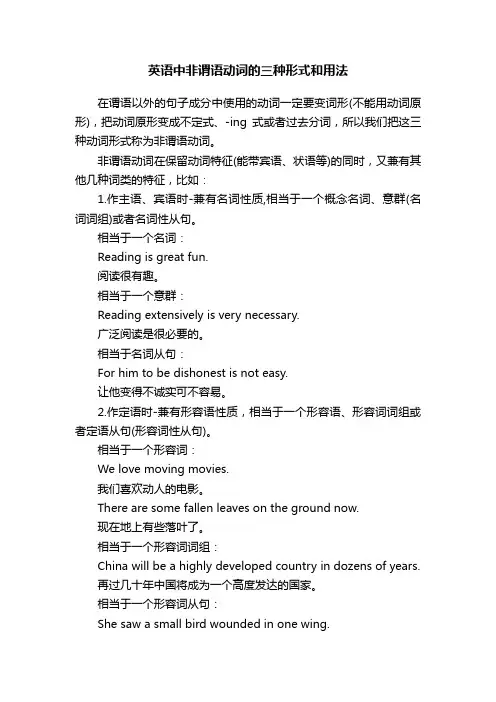
英语中非谓语动词的三种形式和用法在谓语以外的句子成分中使用的动词一定要变词形(不能用动词原形),把动词原形变成不定式、-ing式或者过去分词,所以我们把这三种动词形式称为非谓语动词。
非谓语动词在保留动词特征(能带宾语、状语等)的同时,又兼有其他几种词类的特征,比如:1.作主语、宾语时-兼有名词性质,相当于一个概念名词、意群(名词词组)或者名词性从句。
相当于一个名词:Reading is great fun.阅读很有趣。
相当于一个意群:Reading extensively is very necessary.广泛阅读是很必要的。
相当于名词从句:For him to be dishonest is not easy.让他变得不诚实可不容易。
2.作定语时-兼有形容语性质,相当于一个形容语、形容词词组或者定语从句(形容词性从句)。
相当于一个形容词:We love moving movies.我们喜欢动人的电影。
There are some fallen leaves on the ground now.现在地上有些落叶了。
相当于一个形容词词组:China will be a highly developed country in dozens of years.再过几十年中国将成为一个高度发达的国家。
相当于一个形容词从句:She saw a small bird wounded in one wing.她看见一只有个翅膀受伤的小鸟。
作状语时-兼有副词性质,相当于一个副词、副词词组或者副词从句(状语从句)。
相当于一个副词:She was happy to come.她很高兴地来了。
相当于一个副词词组:To be frank (frankly),I disagree with you.坦率地说,我不同意你的话。
相当于一个副词从句:Being late for class (=Because he was late for class), Tom was afraid to enter the classroom.由于迟到,汤姆不敢进教室。
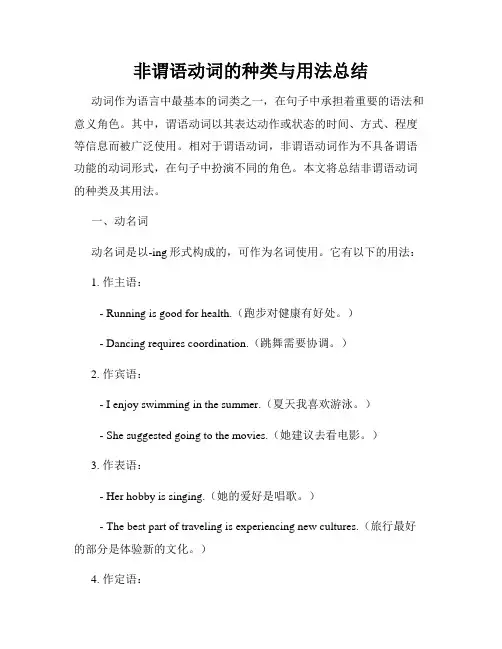
非谓语动词的种类与用法总结动词作为语言中最基本的词类之一,在句子中承担着重要的语法和意义角色。
其中,谓语动词以其表达动作或状态的时间、方式、程度等信息而被广泛使用。
相对于谓语动词,非谓语动词作为不具备谓语功能的动词形式,在句子中扮演不同的角色。
本文将总结非谓语动词的种类及其用法。
一、动名词动名词是以-ing形式构成的,可作为名词使用。
它有以下的用法:1. 作主语:- Running is good for health.(跑步对健康有好处。
)- Dancing requires coordination.(跳舞需要协调。
)2. 作宾语:- I enjoy swimming in the summer.(夏天我喜欢游泳。
)- She suggested going to the movies.(她建议去看电影。
)3. 作表语:- Her hobby is singing.(她的爱好是唱歌。
)- The best part of traveling is experiencing new cultures.(旅行最好的部分是体验新的文化。
)4. 作定语:- The crying baby kept me awake all night.(那个哭闹的婴儿整晚让我没法入睡。
)- I saw a running dog in the street.(我在街上看到一只跑步的狗。
)二、不定式不定式是以to加动词原形构成的,可作为名词、形容词或副词使用。
它有以下的用法:1. 作主语:- To learn a new language requires patience.(学习一门新语言需要耐心。
)- To travel is my dream.(旅行是我的梦想。
)2. 作宾语:- I want to buy a new car.(我想买一辆新车。
)- He needs to finish the report by tomorrow.(他需要在明天之前完成报告。
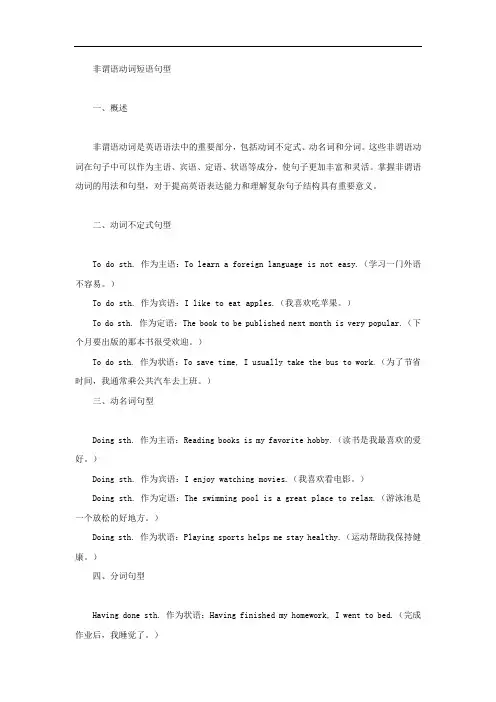
非谓语动词短语句型一、概述非谓语动词是英语语法中的重要部分,包括动词不定式、动名词和分词。
这些非谓语动词在句子中可以作为主语、宾语、定语、状语等成分,使句子更加丰富和灵活。
掌握非谓语动词的用法和句型,对于提高英语表达能力和理解复杂句子结构具有重要意义。
二、动词不定式句型To do sth. 作为主语:To learn a foreign language is not easy.(学习一门外语不容易。
)To do sth. 作为宾语:I like to eat apples.(我喜欢吃苹果。
)To do sth. 作为定语:The book to be published next month is very popular.(下个月要出版的那本书很受欢迎。
)To do sth. 作为状语:To save time, I usually take the bus to work.(为了节省时间,我通常乘公共汽车去上班。
)三、动名词句型Doing sth. 作为主语:Reading books is my favorite hobby.(读书是我最喜欢的爱好。
)Doing sth. 作为宾语:I enjoy watching movies.(我喜欢看电影。
)Doing sth. 作为定语:The swimming pool is a great place to relax.(游泳池是一个放松的好地方。
)Doing sth. 作为状语:Playing sports helps me stay healthy.(运动帮助我保持健康。
)四、分词句型Having done sth. 作为状语:Having finished my homework, I went to bed.(完成作业后,我睡觉了。
)Done sth. 作为状语:Seen from the top of the mountain, the city looks very beautiful.(从山顶看,这个城市非常美丽。
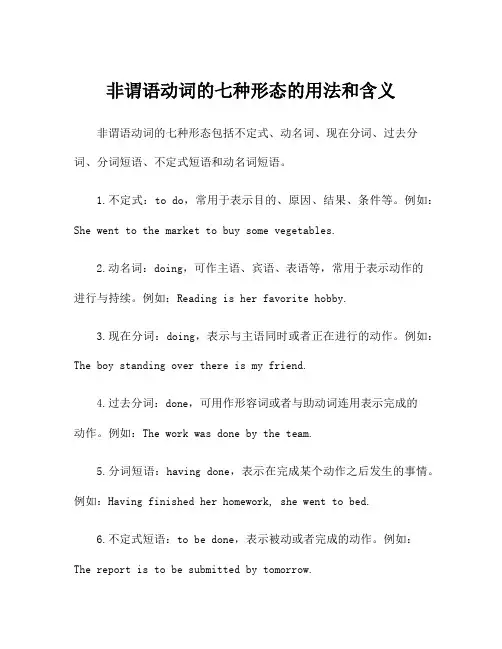
非谓语动词的七种形态的用法和含义
非谓语动词的七种形态包括不定式、动名词、现在分词、过去分词、分词短语、不定式短语和动名词短语。
1.不定式:to do,常用于表示目的、原因、结果、条件等。
例如:She went to the market to buy some vegetables.
2.动名词:doing,可作主语、宾语、表语等,常用于表示动作的
进行与持续。
例如:Reading is her favorite hobby.
3.现在分词:doing,表示与主语同时或者正在进行的动作。
例如:The boy standing over there is my friend.
4.过去分词:done,可用作形容词或者与助动词连用表示完成的
动作。
例如:The work was done by the team.
5.分词短语:having done,表示在完成某个动作之后发生的事情。
例如:Having finished her homework, she went to bed.
6.不定式短语:to be done,表示被动或者完成的动作。
例如:The report is to be submitted by tomorrow.
7.动名词短语:enjoying swimming,表示主语进行的动作是令人愉快的。
例如:She enjoys swimming in the sea.
除了以上七种形态外,非谓语动词还可以组成短语或者从句,常用于虚拟语气、句子的修饰、分句或者非限制性定语从句等。
完全掌握非谓语动词的用法对于提高英语写作和阅读水平非常重要。
非谓语动词用法归纳非谓语动词主要包括不定式、动名词和现在分词。
为了区分这三种不同的非谓语动词的用法和含义,我们将分别从三种非谓语动词在句子中做主语、宾语、宾语补足语、定语、状语、表语以及一些特殊结构句型等角度来区分其用法和细微含义。
1.不定式和动名词作主语的区别(1)动名词作主语通常表示抽象动作;而不定式作主语表示具体动作。
Smoking is prohibited(禁止)here.这里禁止抽烟。
(抽象)It is not very good for you to smoke so much.你抽这么多烟对你身体很不好。
(具体)(2)动名词作主语时,通常用以表示一件已知的事或经验。
不定式短语通常用来表示一件未完成的事或目的。
Climbing mountains is interesting.爬山很有趣。
(经验)(3)不定式做主语,一般用it当形式主语,把作主语的不定式短语后置。
2.不定式、动名词和分词作表语的区别(1)不定式作表语1)不定式作表语一般表示具体动作,特别是表示将来的动作。
To do two things at a time is to do neither.--次做两件事等于未做。
What I would suggest is to start work at once.我的建议是立刻开始干。
2)如果主语是不定式(表示条件),表语也是不定式(表示结果)。
To work means to earn a living.工作就是为了生活。
3)如果主语是以aim,uty,hope,idea,happiness,job,plan,problem,purpose,thing,wish等为中心的名词,或以what引导的名词性从句,不定式作表语是对主语起补充说明作用。
His wish is to buy a luxurious car in the near future.他的希望是在不远的将来买一辆豪华轿车。
英语非谓语动词的用法英语非谓语动词指的是动词在句子中作为名词、形容词或副词使用的形式,不需要用be动词或助动词来构成谓语。
非谓语动词包括不定式、动名词和分词。
它们在句子中有着不同的用法和作用。
1. 不定式不定式是由to+动词原形构成的形式,常作为名词、形容词或副词使用。
不定式可以作为主语、宾语、表语、定语、状语等。
例句:To learn English well is important for me. (作为主语) I want to study abroad. (作为宾语)The best way to improve your speaking is to practice. (作为表语)I have a book to read this weekend. (作为定语)He left the office to catch the last train. (作为状语) 2. 动名词动名词是由动词+ing构成的形式,常作为名词使用。
动名词可以作为主语、宾语、表语、定语、状语等。
例句:Swimming is good for your health. (作为主语)I enjoy playing basketball with my friends. (作为宾语) My hobby is collecting stamps. (作为表语)She saw a man walking down the street. (作为定语)He did his homework while listening to music. (作为状语) 3. 分词分词有两种形式:现在分词和过去分词。
现在分词是由动词+ing 构成的形式,过去分词是由动词的过去分词形式构成的形式。
分词可以作为形容词和状语使用。
例句:The running man is my brother. (现在分词作为形容词)The broken vase is on the floor. (过去分词作为形容词)He left the room, closing the door behind him. (现在分词作为状语)Having finished his homework, he went to bed. (过去分词作为状语)总之,非谓语动词在英语中用法多样,需要根据具体情况来判断其作用和形式。
非谓语动词的三种形式与用法非谓语动词是指在句子中充当其他成分而不担任谓语的动词形式。
一般来说,非谓语动词有三种形式:不定式、动名词和分词。
它们在句子中有着不同的用法和功能。
下面将详细介绍这三种非谓语动词的形式与用法。
一、不定式不定式是动词的一种形式,它可以作为名词、形容词或副词的补语,也可以作为谓语的补语。
不定式一般由“to + 动词原形”构成。
1. 作为名词的补语不定式可以作为名词的补语,起到与名词相同的作用。
例如:- My dream is to travel around the world.(我的梦想是环游世界。
)- I have a lot of work to do.(我有很多事情要做。
)2. 作为形容词的补语不定式可以作为形容词的补语,修饰名词或代词。
例如:- She has a book to read.(她有一本要读的书。
)- I am happy to see you.(见到你我很高兴。
)3. 作为副词的补语不定式可以作为副词的补语,修饰动词、形容词或副词。
例如:- He ran fast to catch the bus.(他快速地跑去赶公交车。
)- I woke up early to prepare for the exam.(我早早醒来准备考试。
)二、动名词动名词是一种以-ing 结尾的动词形式,它可以作为名词的主语、宾语、定语、表语等。
1. 作为名词的主语动名词可以作为句子的主语,表示某种行为或概念。
例如:- Swimming is good exercise.(游泳是一项好的锻炼。
)- Reading books is my favorite hobby.(阅读书籍是我最喜欢的爱好。
)2. 作为名词的宾语动名词可以作为某些动词的宾语,表示被动或完成的动作。
例如:- I enjoy swimming in the sea.(我喜欢在海里游泳。
)- She hates doing household chores.(她讨厌做家务活。
非谓语动词作定语的用法总结
非谓语动词是指不具有主谓结构的动词形式,包括不定式、动名词和分词。
在英语中,非谓语动词也可以用作定语,用来修饰名词或代词。
以下是非谓语动词作定语的用法总结:
1. 不定式作定语:
- 不定式作定语通常放在被修饰的名词之后。
例如:"an easy book to read"(一本容易阅读的书)。
- 不定式作定语可以用来表示目的、用途或结果。
例如:"a tool to fix the bike"(修理自行车的工具)。
2. 动名词作定语:
- 动名词作定语通常放在被修饰的名词之前。
例如:"the swimming pool"(游泳池)。
- 动名词作定语可以用来表示被修饰名词的用途、原因或特征。
例如:"a writing desk"(写字台)。
3. 分词作定语:
- 分词作定语可以是现在分词(-ing形式)或过去分词(-ed形式)。
- 现在分词作定语通常表示正在进行的动作或者被修饰名词的特征。
例如:"a smiling child"(笑着的孩子)。
- 过去分词作定语通常表示被修饰名词的状态或者受到的动作。
例如:"a broken window"(破碎的窗户)。
非谓语动词作定语的用法可以丰富句子,使其更加具体和生动。
熟练掌握这些用法可以帮助我们更好地表达和理解英语。
非谓语动词的一些特殊用法
后只接不定式作宾语的一些常用特殊谓语动词
动词后,不定式,want,hope和wish,
agree,decide,mean,manage,promise,
expect,pretend,且说两位算在此,
要记牢,要记住,掌握它们靠自己。
后接动词不定式做宾语补足语,省略不定式符号“to”的一些常用特殊动词一些动词要掌握,have,let和make,
此三动词是使役,“注意”“观察”“听到”see,
还有feel和watch,使用它们要仔细,
后接“宾补”略去“to”,此点千万要牢记
除此之外,还可以掌握“八字言”
一感feel,二听hear,listen to,三让have,let,make,四看see,look at,observe,watch
后只接动名词做宾语的一些常用特殊动词
特殊动词接“动名”,使用它们要记清,
“放弃”“享受”可“后悔”,
“坚持”“练习”必“完成”,
“延期”“避免”非“介意”
掌握它们今必行。